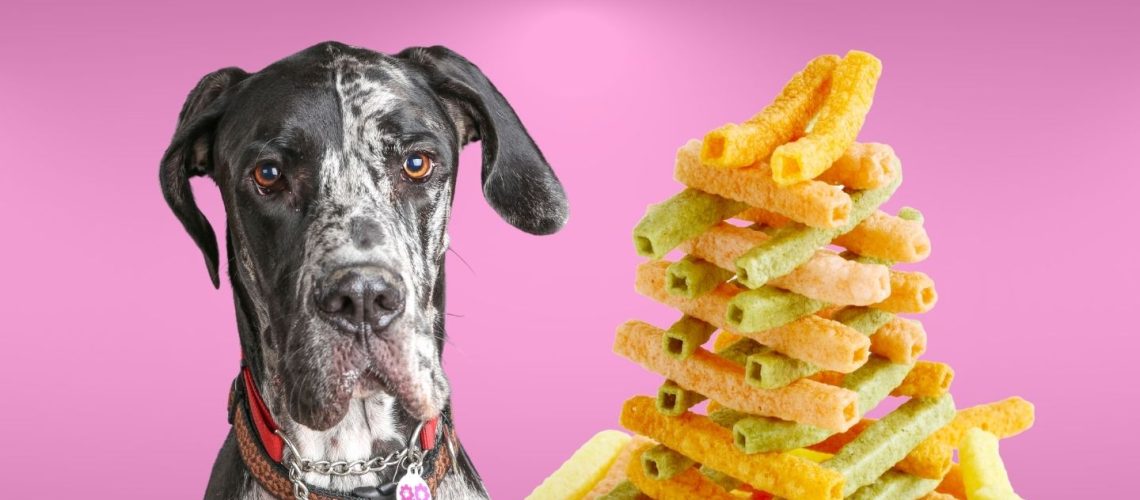The short answer is no, dogs should not eat veggie straws. Veggie straws are typically made from a combination of potatoes, corn, and other vegetables. While these ingredients may not be toxic to dogs, veggie straws are deep fried in oil and contains a blend of salt and spices which are not a suitable part of a balanced diet for canines and can be toxic for dogs.
Introduction: Can Dogs Eat Veggie Straws?
What are veggie straws?
Veggie straws are a popular snack made from a mixture of potatoes, corn, and various vegetables. These ingredients are combined, formed into a straw-like shape, and deep-fried in oil. Veggie straws often contain added salt and various seasonings to enhance their flavor.
Why pet owners may consider giving veggie straws to their dogs
Pet owners may consider giving veggie straws to their dogs because they are made from vegetables and seem like a healthier alternative to conventional potato chips. However, despite their vegetable content, veggie straws should not be fed to dogs due to the reasons discussed below.
Nutritional Content of Veggie Straws
Macronutrients and calories
Though veggie straws may contain some vegetables, they are primarily composed of potatoes and corn, which provide simple carbohydrates and calories. The frying process also adds a significant amount of fat to the snack.
Vitamins and minerals
Veggie straws do contain some trace vitamins and minerals from the vegetables used in their production. However, the amounts are generally not enough to make a significant contribution to a dog's nutritional needs.
Additives and artificial ingredients
Veggie straws often contain added salt and artificial flavors, which can be harmful to dogs if consumed in large quantities.
Potential Health Risks of Veggie Straws for Dogs
High sodium content
The added salt in veggie straws can lead to increased sodium levels in dogs, which can cause high blood pressure, kidney issues, and even be toxic in large amounts.
High fat content
The frying process used to make veggie straws results in a high fat content, which can contribute to obesity and other health issues in dogs.
Digestive issues
Since dogs are not accustomed to the spices and additives found in veggie straws, consuming them can lead to digestive upset and diarrhea.
Allergic reactions
Some dogs may be allergic to certain ingredients in veggie straws, such as artificial flavors, and may experience an allergic reaction if they consume this snack.
Alternatives to Veggie Straws for Dogs
Healthy homemade treats
Instead of feeding your dog veggie straws, consider making healthy homemade dog treats using dog-safe ingredients, such as sweet potatoes or carrots.
Commercial dog treats
Look for commercial dog treats that are made with natural ingredients and do not contain high levels of salt, artificial flavors, or unhealthy fats.
Fruits and vegetables safe for dogs
There are many fruits and vegetables that are safe for dogs to eat, such as blueberries, apples, and green beans. Be sure to do your research and avoid potentially toxic options like grapes and onions.
Tips for Responsible Dog Snack Feeding
Monitor your dog's weight
Keep an eye on your dog's weight to ensure they are not overeating and gaining excessive weight from treat consumption.
Introduce new treats gradually
When introducing a new treat to your dog's diet, do so gradually to avoid digestive problems or food sensitivities.
Consult your veterinarian for personalized advice
Always consult your veterinarian for personalized advice on appropriate treat options and feeding guidelines for your individual dog.
Summary: Can Dogs Eat Veggie Straws?
Recap of potential risks and alternatives
In conclusion, veggie straws are not a suitable snack for dogs due to their high fat and sodium content, as well as potential for digestive problems and allergic reactions. Instead, consider offering your dog healthier alternatives, such as homemade treats or dog-safe fruits and vegetables.
The importance of responsible pet ownership and feeding habits
Responsible pet ownership involves providing your dog with a balanced diet, carefully selecting their treats, and monitoring their overall health. By doing so, you can ensure that your furry friend stays happy and healthy for years to come.










